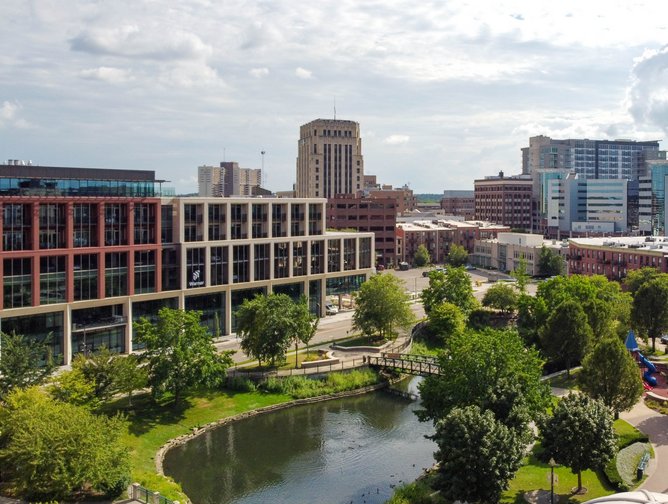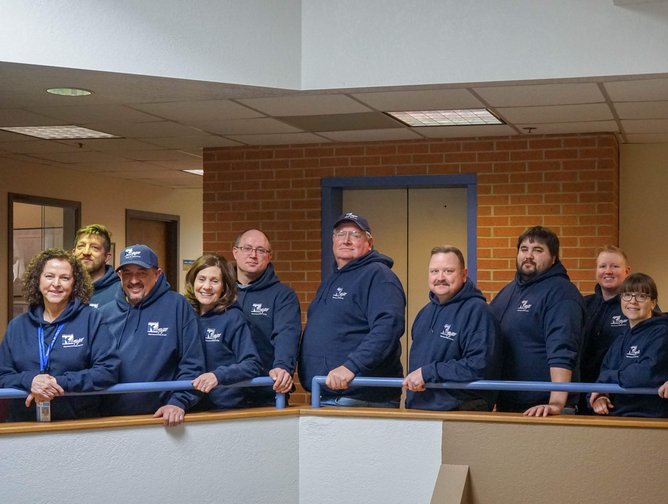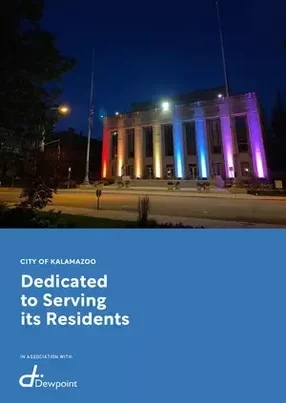The City of Kalamazoo started out as a small village in Southwest Michigan. As the city began to grow following its founding in 1831, it became a city of many firsts. “ We built the first outdoor pedestrian mall in America in 1959, Checker Taxi, a dominant taxi cab company started here, and so did Gibson Guitars. We've continued to grow. Today, we have Western Michigan University, as well as Kalamazoo College and Kalamazoo Valley Community College. We have a young population here with the university and colleges,” says Tim Dubois, CIO for the City of Kalamazoo.
Since joining the city as CIO, Dubois has seen Kalamazoo continuously evolve. “It's continued to evolve from trying to recover from a lot of the tight budgets placed on us and the running costs and maintenance of infrastructure over the past 10 years. We are currently working towards expanding further into digital transformation across the city. We’ve started some initiatives in the smart city area, going beyond just repairing people's computers and taking care of the servers, and moving more into technology and putting that technology into the hands of our departments and the rest of the city.“
Delving deeper into the city’s digital transformation, Dubois explains that Kalamazoo’s strategy has been a bit of a start-stop one. “We’ve come up against issues and problems, and when looking for a solution we intend to find a digital one that can be implemented. But our overall strategy is to move towards a digital government. A core issue in the city is that poverty is a big part of our community. We realise that not everyone can afford to move to digital services, so we also have to keep our manual processes going. We are working to bridge the gap, helping not only our own transformation to go digital but to help our residents move that way as well. This is what we are starting to incorporate into our thinking: ‘how do we improve things so that everyone can be a part of the journey and not just the people that can afford it?
“We have moved some things to online forums already, and we are continuing to move in that direction. I foresee that we will continue in this direction until we are fully online in the future. This again really does depend largely on our residents. If they can’t embrace a digital future then we are not providing a very good government service by moving everything if our residents are unable to operate it.”
Being responsible for the entire IT infrastructure and projects, working with departments to implement technology-based solutions, Dubois explains that the city is looking at various technologies to help it to move online. “One of the things we've done is incorporate a 3-1-1 call centre. So it's a ‘one call to city hall’ type of situation where our ambassadors can help with almost everything that residents want to do from the city perspective. If you need to pay a utility bill, pay taxes or report a pothole, our ambassadors are available to help. The technology provides the capability to access all of our different systems across the city from one spot. 90% of calls to the 3-1-1 call centre can be handled without having to be sent to another department, which is a big focus. We are also updating our website and we are hoping to go live later this year, which will help us to move everything online.”
One technology that has been critical to making all this possible is the cloud. “I keep mentioning that we've moved some stuff online. We couldn't do that without the cloud being available. Currently, we are looking into moving our operations and priority infrastructure to the cloud. But as we look for solutions to interact with and serve our residents, a key component for us is to be able to put the information into the cloud and provide residents with the ability to access it.”
When it comes to the use of IoT, 5G and other advanced technologies, Dubois explains that, “I think 5G is going to be critical to us in the future. When we look at autonomous vehicles and their capabilities across AI and machine learning I foresee it will be a great benefit to us. We've not implemented this yet. We're currently building the foundation so we can do it in the future.
Transforming the City of Kalamazoo into a Smart City
Becoming a smart city goes back to the philosophy of serving residents and how the city can become a better government. “A smart city incorporates technology in order to improve and better itself. To become a smart city we have added the 3-1-1 call centre, and also incorporated some different technologies to allow us to improve when it comes to utilities. We’re putting out smart water metres, we're working with the Metro bus system in Kalamazoo and the Foundation for Excellence to allow high school students to ride the buses for free with their student IDs. This reduces any barrier for them to get to after school activities, to jobs or wherever they need to get to within the city. It helps us to serve our residents a little bit better and make their lives better,” says Dubois.
The Importance of Connectivity and Cybersecurity for a Smart City
With the pandemic highlighting the need for connectivity among the residents of Kalamazoo, the city has been working with the school systems, public libraries and other organisations to enable students to be connected so that they can school remotely during the lockdown.
“We want to transfer this outside of schools, as adult learners and people with jobs may also need to work remotely. The pandemic has accelerated our need for technology and the online world. It has highlighted how important it will be for the future. We need to support our residents and get them online. We're looking at different ways that we can do this, but the process is not as simple as it should be. If we want to move to a digital government, and a digital world, we have to bring our people along with us and help them to get them to where we want them to be,” says Dubois.
Alongside connectivity, data is another programme that the city started to look at a couple of years ago. “We’ve laid the foundations down for promoting data use, reports, and analysis. So far, what we have done has enabled us to connect all of our systems on the backend to the databases so that we have one data lake. Having one spot where we have all the data helps us to analyse and find connections that we may not have noticed before. Our data strategy to make better decisions and implement policies starts here. I am hoping to reach near real time data reports in the future so that the public can see the information,” adds Dubois.
Being a global hot topic, cybersecurity is an important element for Kalamazoo, “I don't think you can be a smart city and not be strong on the cybersecurity side of it. Our strategy has really been to fill the holes that we knew were already there a couple of years ago, and for the most part, we have. So now it’s about being a little more advanced and really continuing to protect our assets, the city, and the city’s infrastructure. Again, this is all tied to what we do as a government to serve our residents. If we were to get hit by a ransomware attack or a virus, and we weren't able to serve our residents, then we're not doing our jobs. There’s so much that goes on when it comes to cybersecurity, and it's a never-ending battle that so far we've been able to do well.”
Looking to the future, Dubois explains that the city plans to add external assessments to its internal ones that they are already doing. “So it's just continuing to grow and evolve into a bigger programme than before. Future plans include partnering with not only cybersecurity companies but with other local governments - which we have already started to do. There is certainly potential for partnering with local businesses and running educational classes for local residents and businesses as well as help everyone improve in that area.
If one person gets hit somebody else is going to get hit as well. So we want to partner together and improve everybody's cybersecurity that way,” concludes Dubois.



